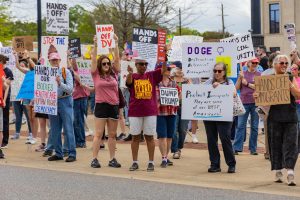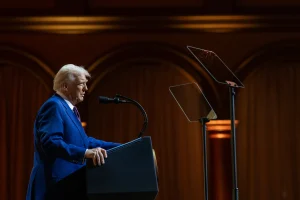We must do more to end discrimination
November 15, 2018
The sound of broken glass crunching underfoot. A celebratory moment where two souls are joined together. A warning bell for an attempted genocide.
Within the Jewish community, the breaking of glass carries a heavy connotation that swings from polar ends. Originally a tradition at a wedding after the exchange of vows, on the night of Nov. 9, 1938, the breaking of glass had a vile purpose to drive out business owners and community members from their homes. Kristallnacht was one of the cataclysmic events to befall European Jews before the start of World War II.
Now, 80 years later, anti-Semitism persists. Less than two weeks ago, a man who survived the Holocaust, whose family made it through the Nazis’ attempt at annihilation, had to witness another attack on his Jewish community in Pittsburgh during a bris, a ceremony for a Jewish baby boy.
Arguing that politics has become too personal barely scratches the surface of the fear and threats the violent rhetoric spurred by our Commander in Tweets elicits. I am a woman of great privilege. A pansexual Asian-American Jewish woman, I would technically check many boxes in a diversity poll. However, I also come from an upper-middle class family. I went to a private Jewish school from K-8 grade, attended sleepaway camp for 7 years and even entertained the possibility of attending boarding school for high school.
There are people out there who believe the “Soros-funded left” – a phrase which itself harkens back to Nazi propaganda painting Jews as money grubbing – must be violently stopped, and part of my privilege is that I have control over who knows that I align with that group.
Even when I wear my Hamsa necklace or Star of David earrings, those flags of identity are a choice I make. Many people don’t have that choice. People of color, people who don’t fall heavily on either end of the gender binary and many other underrepresented populations, including other Jews, often bravely face the world with exactly that: their face, which tends to be a time-invariant piece of their identity upon which others can make their harsh assumptions.
Inevitably, there are horrible people out there that as a society we cannot reach. They cannot empathize with someone else’s suffering and refuse to learn more about the people that make up the world in which they live. Wrapped in a silk cocoon covered in thorns, their ignorance only serves to make those who try to reach out to them bleed.
We see this malevolent ignorance in not-so-little mistakes, like when a Republican candidate alongside Vice President Mike Pence called on a Messianic Jewish rabbi as a representative of the mainstream Jewish community to say a prayer for the Tree of Life shooting, completely disrespecting an already wounded people. Messianic Judaism and Judaism are different religions, mainly diverging where Messianic Judaism believes Jesus is the Messiah.
All this to say, the Jewish community, though only making up around 2 percent of the world’s population, collectively has billions of opinions and experiences, and this is only a snapshot of mine. My experience tells me that people need to work harder to educate themselves on the problems facing communities other than their own. Listen to your peers when they tell you they feel discriminated against on this campus, actively work with them to help them feel welcome and fight against those who would oppress them.
And if empathy doesn’t reach you, then think selfishly. Because if you don’t help those under attack around you, when the attackers come for you, there will be no one left for your defense





















